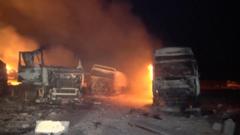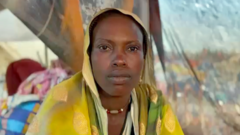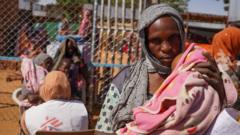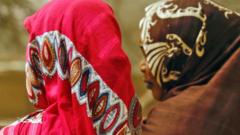As Sudan battles a civil war amidst significant U.S. aid reductions, countless families, particularly children, are facing severe malnutrition and hunger. Reports from Khartoum's soup kitchens highlight the tragic consequences of the aid cutbacks initiated by former President Trump, resulting in the loss of life and essential support for the population.
Humanitarian Crisis in Sudan: The Dire Impact of U.S. Aid Reductions

Humanitarian Crisis in Sudan: The Dire Impact of U.S. Aid Reductions
In the wake of U.S. aid cuts, Sudan faces a growing humanitarian disaster as civil war escalates, leaving millions in need of assistance.
The ongoing civil war in Sudan has intensified the humanitarian disaster facing its citizens, with staggering consequences stemming from recent U.S. aid reductions. This crisis is particularly evident in Khartoum, where a significant number of families are struggling to survive without the crucial support that American aid once provided.
In the recaptured area of Jereif West, Khadija Mousa finds herself in a desperate situation, trying to comfort her malnourished daughter, Fatima. The chilling reality is underscored by the tragic deaths of twelve acutely malnourished children in Khartoum, including 18-month-old Abdo, whose last moments were spent in a clinic before succumbing to starvation. These tragedies reflect a dire humanitarian landscape exacerbated by President Trump’s decision to freeze U.S. foreign assistance, which had constituted a lifeline for countless Sudanese people.
As funding for soup kitchens evaporated in the wake of aid reductions, local workers reported a swift closure of these essential services, with aid worker Duaa Tariq describing the situation as catastrophic. With more than half of Sudan’s population, around 25 million people, experiencing acute hunger, the ramifications of the aid cuts are stark and alarming.
In Jereif West, just days after military forces drove out rival militias, the need for support has never been more pressing. The alarming rise in hunger and malnutrition not only highlights the immediate challenges confronted by those in Khartoum but also calls into question the implications of international assistance policies on vulnerable populations in crisis zones worldwide. While the political ramifications of aid cuts continue to unfold, it is abundantly clear that the humanitarian toll in Sudan remains profound, with innocent children and families bearing the brunt of these decisions.
In the recaptured area of Jereif West, Khadija Mousa finds herself in a desperate situation, trying to comfort her malnourished daughter, Fatima. The chilling reality is underscored by the tragic deaths of twelve acutely malnourished children in Khartoum, including 18-month-old Abdo, whose last moments were spent in a clinic before succumbing to starvation. These tragedies reflect a dire humanitarian landscape exacerbated by President Trump’s decision to freeze U.S. foreign assistance, which had constituted a lifeline for countless Sudanese people.
As funding for soup kitchens evaporated in the wake of aid reductions, local workers reported a swift closure of these essential services, with aid worker Duaa Tariq describing the situation as catastrophic. With more than half of Sudan’s population, around 25 million people, experiencing acute hunger, the ramifications of the aid cuts are stark and alarming.
In Jereif West, just days after military forces drove out rival militias, the need for support has never been more pressing. The alarming rise in hunger and malnutrition not only highlights the immediate challenges confronted by those in Khartoum but also calls into question the implications of international assistance policies on vulnerable populations in crisis zones worldwide. While the political ramifications of aid cuts continue to unfold, it is abundantly clear that the humanitarian toll in Sudan remains profound, with innocent children and families bearing the brunt of these decisions.


















